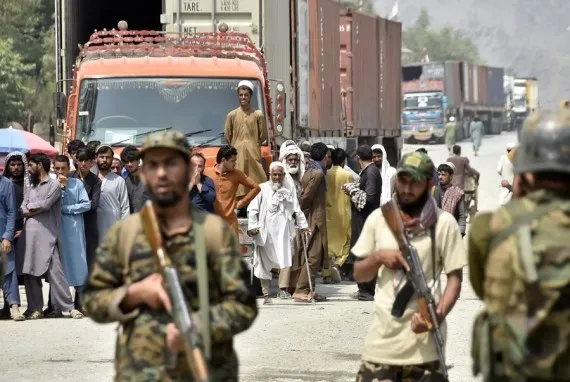Will the Afghanistan-Pakistan border remain a flashpoint for instability in South Asia?

Synopsis
Key Takeaways
- Escalating tensions at the Afghanistan-Pakistan border threaten regional stability.
- Pakistan's airstrikes have resulted in civilian casualties and military retaliation.
- Long-standing grievances are fueling the conflict.
- Civilians are suffering due to disrupted trade and daily activities.
- Without mediation, the situation is likely to worsen.
Kabul, Oct 21 (NationPress) The ongoing tensions at the Afghanistan-Pakistan border have escalated the situation in the region to one of its most critical points since the Taliban assumed control in August 2021. Without significant mediation or enduring confidence-building initiatives, the Afghanistan-Pakistan border is poised to remain a flashpoint for instability in South Asia, as highlighted in a recent report.
A piece from Afghanistan's prominent news outlet, Khaama Press, revealed, "Pakistan's airstrikes on Afghan territory on October 9, 2025, initially labeled by Islamabad as operations targeting Tehreek-i-Taliban Pakistan (TTP) leaders, have developed into a broader and ongoing conflict. These strikes resulted in civilian casualties and triggered an immediate military response from Afghan forces, indicating a significant breakdown of trust between the two neighboring countries."
Pakistan asserted that it undertook these operations to eliminate "high-value militants," including TTP chief Noor Wali Mehsud, who is alleged to have orchestrated multiple attacks against Pakistani security forces. However, Mehsud later appeared in a video claiming he had survived, casting doubt on Pakistan's assertions. The Taliban condemned the airstrikes as violations of sovereignty, labeling them as "acts of aggression" and pledged to respond.
In retaliation, Afghan forces executed counterattacks along the Durand Line, with skirmishes erupting in Paktia, Khost, and Helmand provinces. Afghanistan's Ministry of Defence reported that its troops had captured approximately 25 Pakistani outposts, resulting in the deaths of 58 soldiers and injuries to several others, while Pakistan claimed it had obliterated Taliban positions and killed over 200 Afghan soldiers, figures that Afghanistan has dismissed.
The conflict has severely affected civilians on both sides, forcing many to flee border regions, while daily activities and trade have been disrupted due to the closure of the Torkham and Chaman crossings.
"The current hostilities stem from long-standing grievances. Pakistan has consistently expressed dissatisfaction with the Taliban government's inaction against the TTP, which Islamabad attributes to over 500 attacks in 2025. According to the Pakistan Institute for Conflict and Security Studies, militant violence in 2024 led to over 2,500 fatalities, the highest toll in nearly a decade," the Khaama Press report noted.
Afghanistan's refusal to act has led to increased violence in Balochistan and Khyber Pakhtunkhwa, prompting Islamabad to initiate military actions that have strained bilateral relations. Concurrently, Taliban leaders perceive Pakistan's military actions as a challenge to their sovereignty and part of a long history of political interference.
A temporary ceasefire announced on October 15 collapsed as hostilities reignited in Spin Boldak and Nangarhar. While both Pakistan and the Taliban have expressed support for de-escalation, their military forces remain on high alert, with drone and aerial surveillance ongoing along the border.
"As of mid-October 2025, the conflict remains unresolved. Pakistan's operations have failed to neutralize TTP sanctuaries, while Afghanistan has harnessed nationalist sentiment to present itself as a guardian of sovereignty. With escalating casualties, the breakdown of ceasefire attempts, and deep-seated distrust, the prospects for normalization appear bleak. In the absence of significant mediation or long-term confidence-building measures, the Afghanistan-Pakistan border is set to continue as a flashpoint for instability in South Asia," the report concluded.









